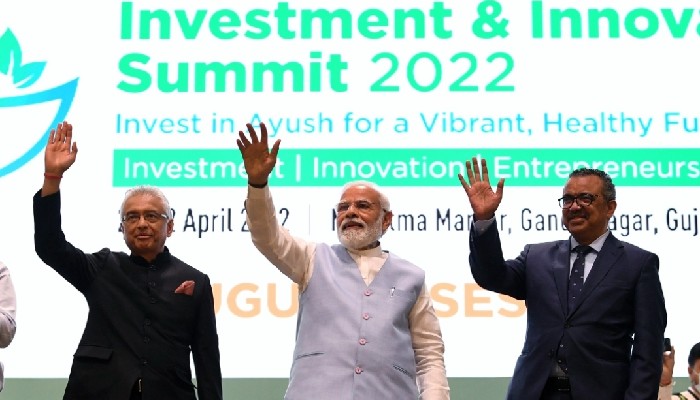Before its target date,India will achieve climate goals: Prime Minister Narendra Modi
Asserting that climate change and calamity are major challenges facing the world, the Prime Minister noted that India has switched to energy-efficient mediums and uses waste to generate energy.
He was speaking after accepting the 2021 CERAWeek Global Energy and Environment Leadership Award for his commitment to energy sustainability and the environment, Modi.
The Prime Minister said there are only two ways to fight climate change and calamities. One is through policies, laws, rules and orders. PM Modi gave examples in this regard. Share of non-fossil sources in India's installed capacity of electricity has grown to 38 percent, adoption of Bharat - 6 emission norms since April 2020 which is equal to Euro - 6 fuel.
Speaking at the event, PM Modi said, “India is working to increase the share of natural gas from the current 6% to 15% by 2030. LNG is being promoted as a fuel. We just launched a National Hydrogen Mission last month for use of hydrogen as fuel. Recently a scheme called PM KUSUM was announced. This will promote an equitable and decentralized model of solar energy generation. But, there is something beyond the world of policies, laws, rules and orders. The most powerful way to fight climate change is behavioral change.”
He said this spirit of behaviour change is a key part of our traditional habits, which teach us consumption with compassion. A mindless throw away culture is not a part of our ethos, he asserted. He felt proud of Indian farmers, who are constantly using modern techniques of irrigation.
He noted that there is growing awareness on improving soil health and reducing use of pesticides.
While the target of mixing 20 per cent ethanol has been advanced to 2025, 5,000 compressed biogas plants will be set up to turn municipal and agriculture waste into energy, he said.
"India is well on track to achieve its Paris agreement targets well before the target date of 2030," he said.
India has maintained that it is not a polluter and cause of climate change and has voluntarily committed to reducing greenhouse gas emission intensity of its GDP by 33-35 per cent below 2005 levels by 2030.
The Prime Minister further noted that India's vision for environmental transitions includes working with like-minded countries.
“The initial success of the International Solar Alliance has demonstrated how serious India is when it comes to making efforts for a better planet. We will keep making such efforts in the future. This is in line with Mahatma Gandhi's principle of trusteeship. At the core of Trusteeship is collectivism, compassion and responsibility. Trusteeship also means using resources responsibly,” he said.
The Prime Minister said for large-scale behaviour change, solutions that are innovative, affordable and powered by public participation need to be offered. He cited examples like people embracing LED bulbs, Give It Up Movement, increased LPG coverage, affordable transportation initiatives. He expressed happiness about the growing acceptance of ethanol across India.
The Prime Minister noted that over the last seven years, India's forest cover has grown significantly, the population of lions, tigers, leopards and water fowls has grown. He cited these as the great indicators of positive behavioural changes.
PM Modi concluded by saying, “Now is the time to think logically and ecologically. After all this is not about me or you. It is about our planet's future. We owe this to our coming generations.”
 Contact Us
Contact Us  Subscribe Us
Subscribe Us









 Contact Us
Contact Us
 Subscribe
Subscribe
 News Letter
News Letter

